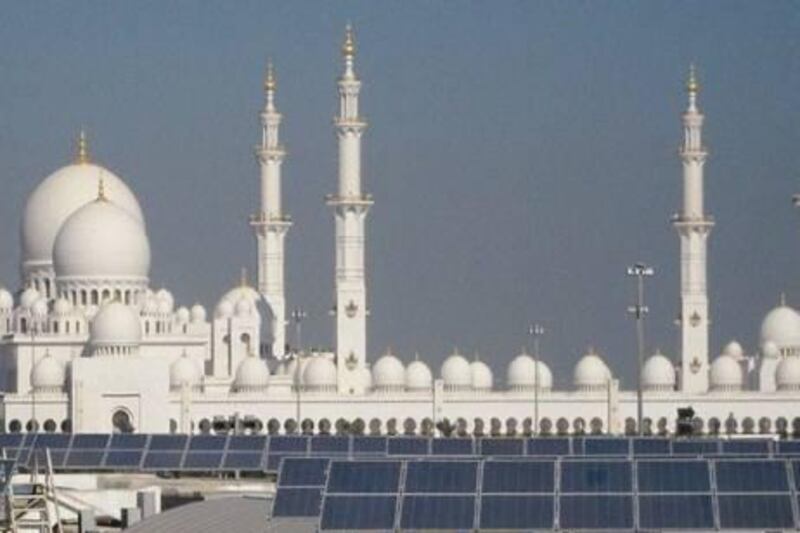ABU DHABI // Solar panels have been fitted to 11 buildings around the capital.
The rooftop systems range in capacity from 15 kilowatts, barely enough to power the air conditioning for one room, to 1 megawatt.
They have been fitted to a mosque, a school and a private villa, and government buildings including the Crown Prince's Court, Abu Dhabi Municipality, the Abu Dhabi National Exhibition Centre and the Armed Forces Officers Club.
"Solar rooftop photovoltaic installations have the potential to be a significant contributor to Abu Dhabi's renewable-energy efforts," said Dr Sultan Al Jaber, the chief executive of the renewable energy company Masdar.
Some of the panels have been in operation for about a year. They have a total capacity of 2.3MW, equal to an annual reduction in carbon emissions of 3,220 tonnes.
But they still make up a tiny proportion of Abu Dhabi's total generating capacity, which is about 7,000MW.
And while proponents of solar power were positive about the initiative, they said more needed to be done.
"These pilot projects are an excellent way forward," said Vahid Fotuhi, the chairman of the Emirates Solar Industry Association. "They enable the utility to become more familiar with how solar roof systems operate in the emirate."
The next step, Mr Fotuhi said, would be to support solar power with coordinated policy.
"There are not yet policies in place to enable home or business owners to connect solar systems to the grid," he said.
Mr Fotuhi said it was essential to remove the bureaucratic barriers if Abu Dhabi was to meet its goal of generating 7 per cent of its electricity from renewable sources by the end of the decade - a more than 600-fold rise in only nine years.
Masdar is building two large-scale solar plants that will add 200MW of capacity but small-scale rooftop systems will also be part of the solution, he said.
"There need to be policies adopted that enable home or business owners that are interested in solar power to instal such systems and connect them to the grid," Mr Fotuhi said.
"Hopefully, with these 11 pilot projects, authorities will have a chance to determine how best to structure rules and regulations."
An official at the Abu Dhabi Water and Electricity Authority said: "The current lack of a mechanism to enable small-scale generators to connect to the grid is a relatively minor barrier to the development of the solar-rooftop industry in Abu Dhabi."
He added the key question was how best to achieve 7 per cent target, and "what part solar-rooftop-generated electricity should play in this".
"Abu Dhabi is a challenging environment in which to operate solar power generation systems," the official said.
"The high levels of dust and aerosol particles significantly reduce the effectiveness of solar systems if they are not regularly cleaned, and can affect some systems more than others."
A spokesman for Masdar said the project was "a pilot project to study the possibility of expansion".






